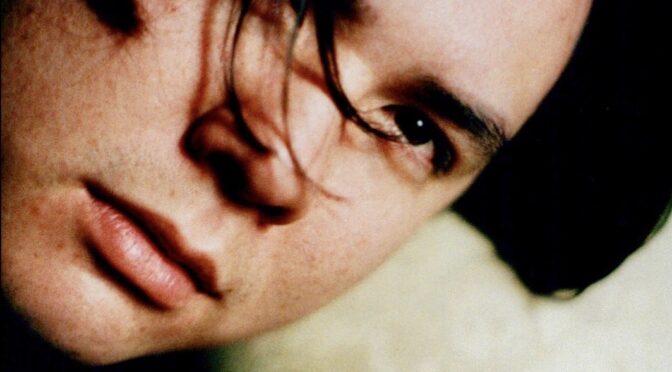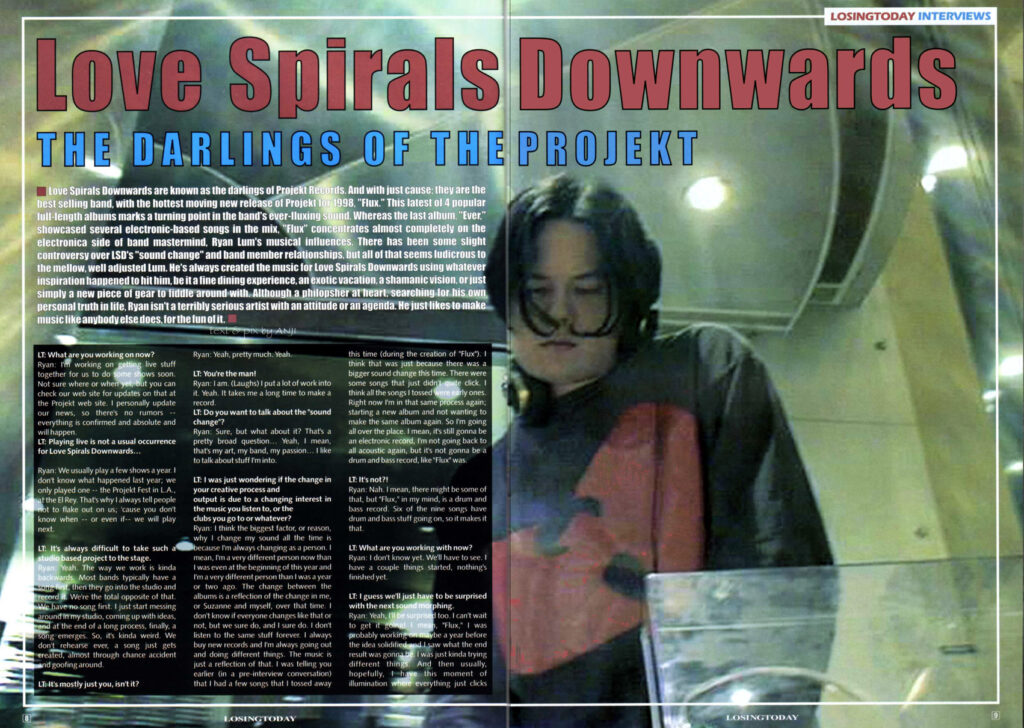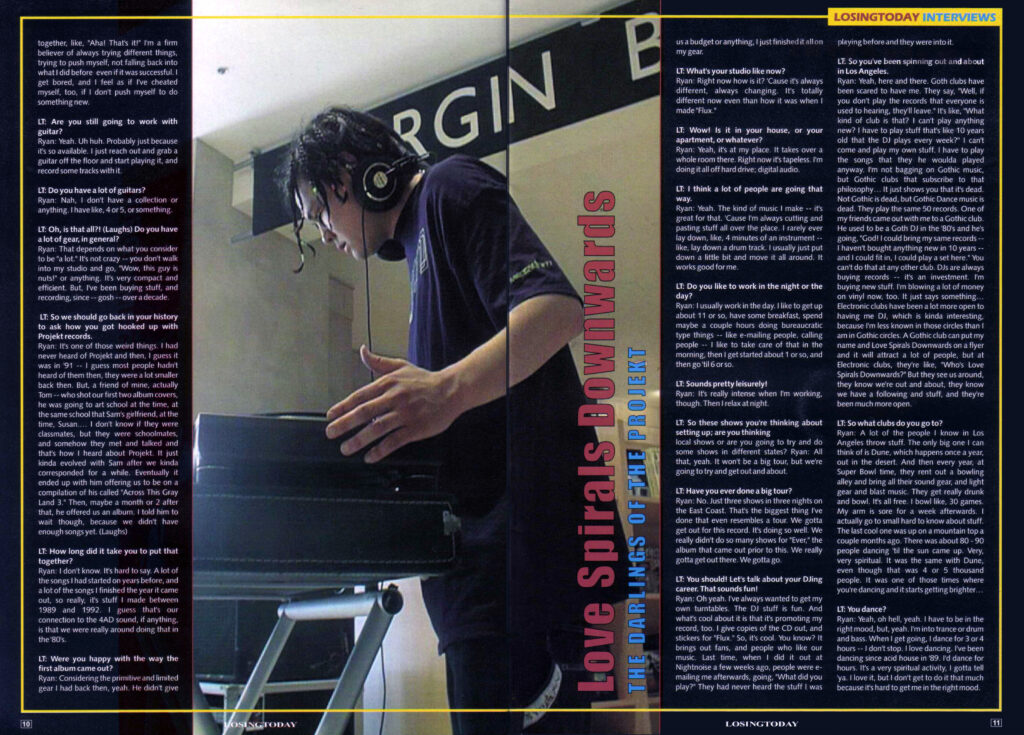THE DARLINGS OF PROJEKT
Interview & photos by Anji Bee
Love Spirals Downwards are known as the darlings of Projekt Records. And with just cause; they are the best selling band, with the hottest moving new release of Projekt for 1998, “Flux.” This latest of 4 popular full-length albums marks a turning point in the band’s ever-fluxing sound. Whereas the last album, “Ever,” showcased several electronic-based songs in the mix, “Flux” concentrates almost completely on the electronica side of band mastermind, Ryan Lum’s musical influences. There has been some slight controversy over LSD’s “sound change” and band member relationships, but all of that seems ludicrous to the mellow, well adjusted Lum. He’s always created the music for Love Spirals Downwards using whatever inspiration happened to hit him, be it a fine dining experience, an exotic vacation, a shamanic vision, or just simply a new piece of gear to fiddle around with. Although a philopsher at heart, searching for his own personal truth in life, Ryan isn’t a terribly serious artist with an attitude or an agenda. He just likes to make music like anybody else does, for the fun of it.
Anji: What are you working on now?
Ryan: I’m working on getting live stuff together for us to do some shows soon. Not sure where or when yet, but you can check our web site for updates on that at the Projekt web site. I personally update our news, so there’s no rumors — everything is confirmed and absolute and will happen.
Anji: Playing live is not a usual occurrence for Love Spirals Downwards…
Ryan: We usually play a few shows a year. I don’t know what happened last year; we only played one — the Projekt Fest in L.A., at the El Rey. That’s why I always tell people not to flake out on us; ’cause you don’t know when — or even if — we will play next.
Anji: It’s always difficult to take such a studio based project to the stage.
Ryan: Yeah. The way we work is kinda backwards. Most bands typically have a song first, then they go into the studio and record it. We’re the total opposite of that. We have no song first. I just start messing around in my studio, coming up with ideas, and at the end of a long process, finally, a song emerges. So, it’s kinda weird. We don’t rehearse ever, a song just gets created, almost through chance accident and goofing around.
Anji: It’s mostly just you, isn’t it?
Ryan: Yeah, pretty much. Yeah.
Anji: You’re the man!
Ryan: I am. (Laughs) I put a lot of work into it. Yeah. It takes me a long time to make a record.
Anji: Do you want to talk about the “sound change”?
Ryan: Sure, but what about it? That’s a pretty broad question… Yeah, I mean, that’s my art, my band, my passion… I like to talk about stuff I’m into.
Anji: I was just wondering if the change in your creative process and output is due to a changing interest in the music you listen to, or the clubs you go to or whatever?
Ryan: I think the biggest factor, or reason, why I change my sound all the time is because I’m always changing as a person. I mean, I’m a very different person now than I was even at the beginning of this year and I’m a very different person than I was a year or two ago. The change between the albums is a reflection of the change in me, or Suzanne and myself, over that time. I don’t know if everyone changes like that or not, but we sure do, and I sure do. I don’t listen to the same stuff forever. I always buy new records and I’m always going out and doing different things. The music is just a reflection of that. I was telling you earlier (in a pre-interview conversation) that I had a few songs that I tossed away this time (during the creation of “Flux”). I think that was just because there was a bigger sound change this time. There were some songs that just didn’t quite click. I think all the songs I tossed were early ones. Right now I’m in that same process again; starting a new album and not wanting to make the same album again. So I’m going all over the place. I mean, it’s still gonna be an electronic record, I’m not going back to all acoustic again, but it’s not gonna be a drum and bass record, like “Flux” was.
Anji: It’s not?!
Ryan: Nah. I mean, there might be some of that, but “Flux,” in my mind, is a drum and bass record. Six of the nine songs have drum and bass stuff going on, so it makes it that.
Anji: What are you working with now?
Ryan: I don’t know yet. We’ll have to see. I have a couple things started, nothing’s finished yet.
Anji: I guess we’ll just have to be surprised with the next sound morphing.
Ryan: Yeah, I’ll be surprised too. I can’t wait to get it going! I mean, “Flux,” I was probably working on maybe a year before the idea solidified and I saw what the end result was gonna be. I was just kinda trying different things. And then usually, hopefully, I have this moment of illumination where everything just clicks together, like, “Aha! That’s it!” I’m a firm believer of always trying different things, trying to push myself, not falling back into what I did before — even if it was successful. I get bored, and I feel as if I’ve cheated myself, too, if I don’t push myself to do something new.
Anji: Are you still going to work with guitar?
Ryan: Yeah. Uh huh. Probably just because it’s so available. I just reach out and grab a guitar off the floor and start playing it, and record some tracks with it.
Anji: Do you have a lot of guitars?
Ryan: Nah, I don’t have a collection or anything. I have like, 4 or 5, or something.
Anji: Oh, is that all?! (Laughs) Do you have a lot of gear, in general?
Ryan: That depends on what you consider to be “a lot.” It’s not crazy — you don’t walk into my studio and go, “Wow, this guy is nuts!” or anything. It’s very compact and efficient. But, I’ve been buying stuff, and recording, since — gosh — over a decade.
Anji: So we should go back in your history to ask how you got hooked up with Projekt records.
Ryan: It’s one of those weird things. I had never heard of Projekt and then, I guess it was in ’91 — I guess most people hadn’t heard of them then, they were a lot smaller back then. But, a friend of mine, actually Tom — who shot our first two album covers, he was going to art school at the time, at the same school that Sam’s girlfriend, at the time, Susan.… I don’t know if they were classmates, but they were schoolmates, and somehow they met and talked and that’s how I heard about Projekt. It just kinda evolved with Sam after we kinda corresponded for a while. Eventually it ended up with him offering us to be on a compilation of his called “Across This Gray Land 3.” Then, maybe a month or 2 after that, he offered us an album. I told him to wait though, because we didn’t have enough songs yet. (Laughs)
Anji: How long did it take you to put that together?
Ryan: I don’t know. It’s hard to say. A lot of the songs I had started on years before, and a lot of the songs I finished the year it came out, so really, it’s stuff I made between 1989 and 1992. I guess that’s our connection to the 4AD sound, if anything, is that we were really around doing that in the ’80’s.
Anji: Were you happy with the way the first album came out?
Ryan: Considering the primitive and limited gear I had back then, yeah. He didn’t give us a budget or anything, I just finished it all on my gear.
Anji: What’s your studio like now?
Ryan: Right now how is it? ‘Cause it’s always different, always changing. It’s totally different now even than how it was when I made “Flux.”
Anji: Wow! Is it in your house, or your apartment, or whatever?
Ryan: Yeah, it’s at my place. It takes over a whole room there. Right now it’s tapeless. I’m doing it all off hard drive; digital audio.
Anji: I think a lot of people are going that way.
Ryan: Yeah. The kind of music I make — it’s great for that. ‘Cause I’m always cutting and pasting stuff all over the place. I rarely ever lay down, like, 4 minutes of an instrument — like, lay down a drum track. I usually just put down a little bit and move it all around. It works good for me.
Anji: Do you like to work in the night or the day?
Ryan: I usually work in the day. I like to get up about 11 or so, have some breakfast, spend maybe a couple hours doing bureaucratic type things — like e-mailing people, calling people — I like to take care of that in the morning, then I get started about 1 or so, and then go ’til 6 or so.
Anji: Sounds pretty leisurely!
Ryan: It’s really intense when I’m working, though. Then I relax at night.
Anji: So these shows you’re thinking about setting up; are you thinking local shows or are you going to try and do some shows in different states?
Ryan: All that, yeah. It won’t be a big tour, but we’re going to try and get out and about.
Anji: Have you ever done a big tour?
Ryan: No. Just three shows in three nights on the East Coast. That’s the biggest thing I’ve done that even resembles a tour. We gotta get out for this record. It’s doing so well. We really didn’t do so many shows for “Ever,” the album that came out prior to this. We really gotta get out there. We gotta go.
Anji: You should! Let’s talk about your DJing career. That sounds fun!
Ryan: Oh yeah. I’ve always wanted to get my own turntables. The DJ stuff is fun. And what’s cool about it is that it’s promoting my record, too. I give copies of the CD out, and stickers for “Flux.” So, it’s cool. You know? It brings out fans, and people who like our music. Last time, when I did it out at Nightnoise a few weeks ago, people were e-mailing me afterwards, going, “What did you play?” They had never heard the stuff I was playing before and they were into it.
Anji: So you’ve been spinning out and about in Los Angeles.
Ryan: Yeah, here and there. Goth clubs have been scared to have me. They say, “Well, if you don’t play the records that everyone is used to hearing, they’ll leave.” It’s like, “What kind of club is that? I can’t play anything new? I have to play stuff that’s like 10 years old that the DJ plays every week?” I can’t come and play my own stuff. I have to play the songs that they he woulda played anyway. I’m not bagging on Gothic music, but Gothic clubs that subscribe to that philosophy… It just shows you that it’s dead. Not Gothic is dead, but Gothic Dance music is dead. They play the same 50 records. One of my friends came out with me to a Gothic club. He used to be a Goth DJ in the ’80’s and he’s going, “God! I could bring my same records — I haven’t bought anything new in 10 years — and I could fit in, I could play a set here.” You can’t do that at any other club. DJs are always buying records — it’s an investment. I’m buying new stuff. I’m blowing a lot of money on vinyl now, too. It just says something… Electronic clubs have been a lot more open to having me DJ, which is kinda interesting, because I’m less known in those circles than I am in Gothic circles. A Gothic club can put my name and Love Spirals Downwards on a flyer and it will attract a lot of people, but at Electronic clubs, they’re like, “Who’s Love Spirals Downwards?” But they see us around, they know we’re out and about, they know we have a following and stuff, and they’re been much more open.
Anji: So what clubs do you go to?
Ryan: A lot of the people I know in Los Angeles throw stuff. The only big one I can think of is Dune, which happens once a year, out in the desert. And then every year, at Super Bowl time, they rent out a bowling alley and bring all their sound gear, and light gear and blast music. They get really drunk and bowl. It’s all free. I bowl like, 30 games. My arm is sore for a week afterwards. I actually go to small hard to know about stuff. The last cool one was up on a mountain top a couple months ago. There was about 80 – 90 people dancing ’til the sun came up. Very, very spiritual. It was the same with Dune, even though that was 4 or 5 thousand people. It was one of those times where you’re dancing and it starts getting brighter…
Anji: You dance?
Ryan: Yeah, oh hell, yeah. I have to be in the right mood, but, yeah. I’m into trance or drum and bass. When I get going, I dance for 3 or 4 hours — I don’t stop. I love dancing. I’ve been dancing since acid house in ’89. I’d dance for hours. It’s a very spiritual activity, I gotta tell ‘ya. I love it, but I don’t get to do it that much because it’s hard to get me in the right mood.



